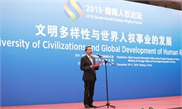Truths about Xinjiang the Western media won't tell
https://youtu.be/smxScIJ-CP4
CGTN recently released two documentaries about the #Xinjiang Uygur Autonomous Region. They contain footage from some of the terrorist attacks in the last decade. They focus on the fight against #terrorism and how the region has been hurt by terrorism and religious extremism. They also illustrate terrorists' connection with some overseas forces. The productions have become a hit on the internet with more than 67 million views. However, most Western mainstream media, which have been very vocal about Xinjiang-related issues, remain silent on the two videos.
Subscribe to us on YouTube: https://goo.gl/lP12gA
Fighting terrorism in Xinjiang
https://youtu.be/u4cYE6E27_g
Between 1990 and 2016, thousands of terrorist attacks shook the Xinjiang Uygur Autonomous Region in northwestern China, killing large numbers of innocent people and hundreds of police officers. Horrific stabbings and bombings rocked the land once known as a commercial hub on China's ancient Silk Road. The damage to local communities was incalculable while stability in the region quickly deteriorated. Authorities have been trying hard to restore peace to this land. In this exclusive CGTN exposé, we show you never-before-seen footage documenting the frightening tragedies in Xinjiang and the resilience of its people. #Xinjiang #Antiterrorism #Fightingterrorism
simulazione antiterrorismo
Liu Xin discusses CGTN's documentary on China's Xinjiang
https://youtu.be/h2yMjbB1q24
While the Chinese government has been trying hard to protect individuals' safety in Xinjiang and the region's stability, it's also facing tremendous skepticism and criticism from some Western countries for the so-called abuses of human rights, among other accusations. Two documentaries were released last week, showing China's efforts to fight extremism and terrorism in Xinjiang. Liu Xin looks at some clips from the documentaries, which include never-before-seen footage, to find out the bigger-picture context and origin of the policies in Xinjiang.
Guests: Professor Huo Zhengxin, from China University of Political Science and Law; Professor John Gong, from the University of International Business and Economics.
The video footage may be disturbing to viewers. We advise viewer discretion.
Subscribe to us on YouTube: https://goo.gl/lP12gA
https://youtu.be/iSaRpKsjzNU
https://youtu.be/4QwIAzknHss
ETIM's separatist strategy
https://youtu.be/JoKcWkYc3eg
Fighting terrorism in Xinjiang
https://youtu.be/u4cYE6E27_g
Between 1990 and 2016, thousands of terrorist attacks shook the Xinjiang Uygur Autonomous Region in northwestern China, killing large numbers of innocent people and hundreds of police officers. Horrific stabbings and bombings rocked the land once known as a commercial hub on China's ancient Silk Road. The damage to local communities was incalculable while stability in the region quickly deteriorated. Authorities have been trying hard to restore peace to this land. In this exclusive CGTN exposé, we show you never-before-seen footage documenting the frightening tragedies in Xinjiang and the resilience of its people. #Xinjiang #Antiterrorism #Fightingterrorism
simulazione antiterrorismo
Liu Xin discusses CGTN's documentary on China's Xinjiang
https://youtu.be/h2yMjbB1q24
While the Chinese government has been trying hard to protect individuals' safety in Xinjiang and the region's stability, it's also facing tremendous skepticism and criticism from some Western countries for the so-called abuses of human rights, among other accusations. Two documentaries were released last week, showing China's efforts to fight extremism and terrorism in Xinjiang. Liu Xin looks at some clips from the documentaries, which include never-before-seen footage, to find out the bigger-picture context and origin of the policies in Xinjiang.
Guests: Professor Huo Zhengxin, from China University of Political Science and Law; Professor John Gong, from the University of International Business and Economics.
The video footage may be disturbing to viewers. We advise viewer discretion.
Subscribe to us on YouTube: https://goo.gl/lP12gA
https://youtu.be/iSaRpKsjzNU
Countless terrorist attacks occurred in China's northwestern region of Xinjiang from 1990 to 2016. Terrorism has destroyed many innocent lives, similar to what has happened around the world. Such extremism has
uprooted the peaceful lives of local residents in the region.#Xinjiang #Antiterrorism #Fightingterrorism
Subscribe to us on YouTube: https://goo.gl/lP12gA
China’s Most Direct Security Threat
China’s Most Direct Security Threat
Chaos was rampant in China’s westernmost region. Explosions and other violence struck terror in the hearts of residents in the country's Xinjiang region. The victims and survivors should be remembered in China's current fight against terrorism.
https://youtu.be/4QwIAzknHss
ETIM's separatist strategy
https://youtu.be/JoKcWkYc3eg
The border area of Aksu in China's Xinjiang is the frontline of the country's fight against terrorism. Police have engaged in operations to subdue terrorists who had killed innocent people in their belief that such actions would make them "martyrs" and help them enter "paradise."
#Xinjiang #Antiterrorism #Fightingterrorism
Subscribe to us on YouTube: https://goo.gl/lP12gA
The Long Term Fight
https://youtu.be/rXJ0t7f457k
Terrorist acts in modern China are just using religious extremism as a banner to separate Xinjiang from the country. ETIM, one of the most wanted terrorist organizations in the country, has been creating strife to divide ethnic groups and religions in the region for decades. Many of its members were trained outside the country in extremist thought, returning to the country to apply their radical ideologies. #Xinjiang #Antiterrorism #Fightingterrorism Subscribe to us on YouTube: https://goo.gl/lP12gA
Road to extremism
The Long Term Fight
https://youtu.be/rXJ0t7f457k
Terrorist acts in modern China are just using religious extremism as a banner to separate Xinjiang from the country. ETIM, one of the most wanted terrorist organizations in the country, has been creating strife to divide ethnic groups and religions in the region for decades. Many of its members were trained outside the country in extremist thought, returning to the country to apply their radical ideologies. #Xinjiang #Antiterrorism #Fightingterrorism Subscribe to us on YouTube: https://goo.gl/lP12gA
Road to extremism
https://youtu.be/wmdDrjJvNYo
 An SUV slammed through the barricades in Beijing's iconic Tian'anmen Square in 2013, killing two and wounding 40. The three attackers had sworn the so-called jihad on the hills of Urumqi, a bustling city in China's Xinjiang region.
#Xinjiang #Antiterrorism #Fightingterrorism
Subscribe to us on YouTube: https://goo.gl/lP12gA
An SUV slammed through the barricades in Beijing's iconic Tian'anmen Square in 2013, killing two and wounding 40. The three attackers had sworn the so-called jihad on the hills of Urumqi, a bustling city in China's Xinjiang region.
#Xinjiang #Antiterrorism #Fightingterrorism
Subscribe to us on YouTube: https://goo.gl/lP12gA
Taking down 9:11 wannabes on Chinese plane
https://youtu.be/oMrPnzZjRUY
Crew and passengers on a Chinese flight en route from Hotan to Urumqi saved countless lives when they helped foil a "9/11"-style bomb plot by six members of ETIM, a leading terrorist group in China.
===================== #Xinjiang #Antiterrorism =====================
This is one of many human stories in our exclusive documentary “The black hand in Xinjiang.” Watch the full documentary: https://news.cgtn.com/news/2019-12-07...
Subscribe to us on YouTube: https://goo.gl/lP12gA
US practises ‘double standards’
Beijing reacts to claims by Washington over human rights violations

Business as usual: People walking by a hat shop in Kashgar City, Xinjiang Uighur autonomous region. — China Daily/ANN
BEIJING: China slammed the United States over the latter’s poor human rights conditions for Muslims, and said Washington is telling lies about China’s policies in the Xinjiang Uighur autonomous region.
The denunciation came yesterday after Commander of the US Indo-Pacific Command Navy Adm Philip Davidson attacked China for “the suffering” of the Uighur ethnic group in Xinjiang, and US Ambassador to China Terry Branstad discussed ethnic groups in Xinjiang in a statement.
“Some people in the US have shown unusual care for the Uighur ethnic group in China’s Xinjiang, but they seem to forget that the US is the only country in the world that has issued a ‘Muslim ban’ that targeted Muslim groups, ” said Foreign Ministry spokesman Hua Chunying.
The US has stirred up wars in Iraq, Syria, Libya and Afghanistan, all Muslim countries, “causing the casualties of millions of innocent people”, Hua said.
Citing a survey by the Pew Research Center issued in July 2017, the spokesman said that 75% of US Muslim adults said there is a lot of discrimination against Muslims in the US, and that 69% of people in the US in general share the view.
Also, 50% said it has become more difficult to be Muslim in the US in recent years, the survey shows.
The spokesman also cited a report issued in April 2018 by the Council on American-Islamic Relations, a US-based organisation, saying, “More than a third of anti-Muslim incidents in 2017 were instigated by federal government agencies”. — China Daily/ANN
Read more:
Foreign officials called on China to take the lead to
redefine the concept of human rights which truly cares about people and
amplifies the much-ignored voices of developing nations.
 An SUV slammed through the barricades in Beijing's iconic Tian'anmen Square in 2013, killing two and wounding 40. The three attackers had sworn the so-called jihad on the hills of Urumqi, a bustling city in China's Xinjiang region.
#Xinjiang #Antiterrorism #Fightingterrorism
Subscribe to us on YouTube: https://goo.gl/lP12gA
An SUV slammed through the barricades in Beijing's iconic Tian'anmen Square in 2013, killing two and wounding 40. The three attackers had sworn the so-called jihad on the hills of Urumqi, a bustling city in China's Xinjiang region.
#Xinjiang #Antiterrorism #Fightingterrorism
Subscribe to us on YouTube: https://goo.gl/lP12gATaking down 9:11 wannabes on Chinese plane
https://youtu.be/oMrPnzZjRUY
Crew and passengers on a Chinese flight en route from Hotan to Urumqi saved countless lives when they helped foil a "9/11"-style bomb plot by six members of ETIM, a leading terrorist group in China.
===================== #Xinjiang #Antiterrorism =====================
This is one of many human stories in our exclusive documentary “The black hand in Xinjiang.” Watch the full documentary: https://news.cgtn.com/news/2019-12-07...
Subscribe to us on YouTube: https://goo.gl/lP12gA
US practises ‘double standards’
Beijing reacts to claims by Washington over human rights violations

Business as usual: People walking by a hat shop in Kashgar City, Xinjiang Uighur autonomous region. — China Daily/ANN
BEIJING: China slammed the United States over the latter’s poor human rights conditions for Muslims, and said Washington is telling lies about China’s policies in the Xinjiang Uighur autonomous region.
The denunciation came yesterday after Commander of the US Indo-Pacific Command Navy Adm Philip Davidson attacked China for “the suffering” of the Uighur ethnic group in Xinjiang, and US Ambassador to China Terry Branstad discussed ethnic groups in Xinjiang in a statement.
“Some people in the US have shown unusual care for the Uighur ethnic group in China’s Xinjiang, but they seem to forget that the US is the only country in the world that has issued a ‘Muslim ban’ that targeted Muslim groups, ” said Foreign Ministry spokesman Hua Chunying.
The US has stirred up wars in Iraq, Syria, Libya and Afghanistan, all Muslim countries, “causing the casualties of millions of innocent people”, Hua said.
Citing a survey by the Pew Research Center issued in July 2017, the spokesman said that 75% of US Muslim adults said there is a lot of discrimination against Muslims in the US, and that 69% of people in the US in general share the view.
Also, 50% said it has become more difficult to be Muslim in the US in recent years, the survey shows.
The spokesman also cited a report issued in April 2018 by the Council on American-Islamic Relations, a US-based organisation, saying, “More than a third of anti-Muslim incidents in 2017 were instigated by federal government agencies”. — China Daily/ANN
Read more:
China always protects freedom of religious beliefs | New ...
 Forum enriches human rights
Forum enriches human rights
Foreign officials called on China to take the lead to
redefine the concept of human rights which truly cares about people and
amplifies the much-ignored voices of developing nations.Related pots:
The Black Hand - ETIM and Terrorism in Xinjiang, American human rights, freedom and democracy condemned
https://youtu.be/Hy9PZeMtPKs China’s Most Direct Security Threat Chaos was rampant in China’s westernmost region. Explosions and o..
-
https://youtu.be/UT57tZrqWDQ Between 1990 and 2016, thousands of terrorist attacks shook the Xinjiang Uygur Autonomous Region in nort...
-
https://youtu.be/bRy1AKUzb2o China airs Xinjiang truths Fresh and shocking footage recorded in Xinjiang over the past two decades ha...
'We lied, we cheated, we stole', ‘the Glory of American experiment’ by US Secretary of State/Ex-CIA director Mike Pompeo
US Secretary of State Mike Pompeo: "I was the CIA director. We lied, we cheated, we stole. We had entire training courses. It reminds you of the glory of the American experiment."
















